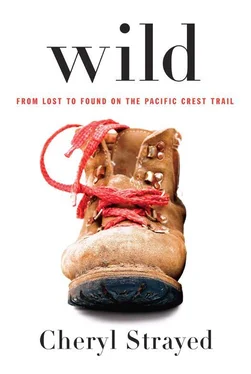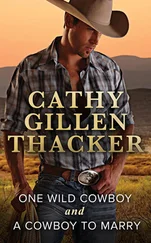Cheryl Strayed - Wild
Здесь есть возможность читать онлайн «Cheryl Strayed - Wild» весь текст электронной книги совершенно бесплатно (целиком полную версию без сокращений). В некоторых случаях можно слушать аудио, скачать через торрент в формате fb2 и присутствует краткое содержание. Год выпуска: 2012, ISBN: 2012, Жанр: Современная проза, на английском языке. Описание произведения, (предисловие) а так же отзывы посетителей доступны на портале библиотеки ЛибКат.
- Название:Wild
- Автор:
- Жанр:
- Год:2012
- ISBN:978-0-307-95765-8
- Рейтинг книги:4 / 5. Голосов: 1
-
Избранное:Добавить в избранное
- Отзывы:
-
Ваша оценка:
- 80
- 1
- 2
- 3
- 4
- 5
Wild: краткое содержание, описание и аннотация
Предлагаем к чтению аннотацию, описание, краткое содержание или предисловие (зависит от того, что написал сам автор книги «Wild»). Если вы не нашли необходимую информацию о книге — напишите в комментариях, мы постараемся отыскать её.
Wild — читать онлайн бесплатно полную книгу (весь текст) целиком
Ниже представлен текст книги, разбитый по страницам. Система сохранения места последней прочитанной страницы, позволяет с удобством читать онлайн бесплатно книгу «Wild», без необходимости каждый раз заново искать на чём Вы остановились. Поставьте закладку, и сможете в любой момент перейти на страницу, на которой закончили чтение.
Интервал:
Закладка:
She went to college and earned straight As.
Sometimes I hugged her exuberantly when I saw her on campus; other times I sailed on by, as if she were no one to me at all.
We were both seniors in college when we learned she had cancer. By then we weren’t at St. Thomas anymore. We’d both transferred to the University of Minnesota after that first year — she to the Duluth campus, I to the one in Minneapolis — and, much to our amusement, we shared a major. She was double majoring in women’s studies and history, I in women’s studies and English. At night, we’d talk for an hour on the phone. I was married by then, to a good man named Paul. I’d married him in the woods on our land, wearing a white satin and lace dress my mother had sewn.
After she got sick, I folded my life down. I told Paul not to count on me. I would have to come and go according to my mother’s needs. I wanted to quit school, but my mother ordered me not to, begging me, no matter what happened, to get my degree. She herself took what she called a break. She only needed to complete a couple more classes to graduate, and she would, she told me. She would get her BA if it killed her, she said, and we laughed and then looked at each other darkly. She’d do the work from her bed. She’d tell me what to type and I’d type it. She would be strong enough to start in on those last two classes soon, she absolutely knew. I stayed in school, though I convinced my professors to allow me to be in class only two days each week. As soon as those two days were over, I raced home to be with my mother. Unlike Leif and Karen, who could hardly bear to be in our mother’s presence once she got sick, I couldn’t bear to be away from her. Plus, I was needed. Eddie was with her when he could be, but he had to work. Someone had to pay the bills.
I cooked food that my mother tried to eat, but rarely could she eat. She’d think she was hungry and then she’d sit like a prisoner staring down at the food on her plate. “It looks good,” she’d say. “I think I’ll be able to eat it later.”
I scrubbed the floors. I took everything from the cupboards and put new paper down. My mother slept and moaned and counted and swallowed her pills. On good days she sat in a chair and talked to me.
There was nothing much to say. She’d been so transparent and effusive and I so inquisitive that we’d already covered everything. I knew that her love for me was vaster than the ten thousand things and also the ten thousand things beyond that. I knew the names of the horses she had loved as a girl: Pal and Buddy and Bacchus. I knew she’d lost her virginity at seventeen with a boy named Mike. I knew how she met my father the next year and what he seemed like to her on their first few dates. How, when she’d broken the news of her unwed teen pregnancy to her parents, her father had dropped a spoon. I knew she loathed going to confession and also the very things that she’d confessed. Cursing and sassing off to her mom, bitching about having to set the table while her much younger sister played. Wearing dresses out the door on her way to school and then changing into the jeans she’d stashed in her bag. All through my childhood and adolescence I’d asked and asked, making her describe those scenes and more, wanting to know who said what and how, what she’d felt inside while it was going on, where so-and-so stood and what time of day it was. And she’d told me, with reluctance or relish, laughing and asking why on earth I wanted to know. I wanted to know. I couldn’t explain.
But now that she was dying, I knew everything. My mother was in me already. Not just the parts of her that I knew, but the parts of her that had come before me too.
It wasn’t long that I had to go back and forth between Minneapolis and home. A little more than a month. The idea that my mother would live a year quickly became a sad dream. We’d gone to the Mayo Clinic on February 12. By the third of March, she had to go to the hospital in Duluth, seventy miles away, because she was in so much pain. As she dressed to go, she found that she couldn’t put on her own socks and she called me into her room and asked me to help. She sat on the bed and I got down on my knees before her. I had never put socks on another person, and it was harder than I thought it would be. They wouldn’t slide over her skin. They went on crooked. I became furious with my mother, as if she were purposely holding her foot in a way that made it impossible for me. She sat back, leaning on her hands on the bed, her eyes closed. I could hear her breathing deeply, slowly.
“God damn it,” I said. “Help me.”
My mother looked down at me and didn’t say a word for several moments.
“Honey,” she said eventually, gazing at me, her hand reaching to stroke the top of my head. It was a word she used often throughout my childhood, delivered in a highly specific tone. This is not the way I wanted it to be, that single honey said, but it was the way it was. It was this very acceptance of suffering that annoyed me most about my mom, her unending optimism and cheer.
“Let’s go,” I said after I’d wrestled her shoes on.
Her movements were slow and thick as she put on her coat. She held on to the walls as she made her way through the house, her two beloved dogs following her as she went, pushing their noses into her hands and thighs. I watched the way she patted their heads. I didn’t have a prayer anymore. The words fuck them were two dry pills in my mouth.
“Bye, darlings,” she said to the dogs. “Bye, house,” she said as she followed me out the door.
It hadn’t occurred to me that my mother would die. Until she was dying, the thought had never entered my mind. She was monolithic and insurmountable, the keeper of my life. She would grow old and still work in the garden. This image was fixed in my mind, like one of the memories from her childhood that I’d made her explain so intricately that I remembered it as if it were mine. She would be old and beautiful like the black-and-white photo of Georgia O’Keeffe I’d once sent her. I held fast to this image for the first couple of weeks after we left the Mayo Clinic, and then, once she was admitted to the hospice wing of the hospital in Duluth, that image unfurled, gave way to others, more modest and true. I imagined my mother in October; I wrote the scene in my mind. And then the one of my mother in August and another in May. Each day that passed, another month peeled away.
On her first day in the hospital, a nurse offered my mother morphine, but she refused. “Morphine is what they give to dying people,” she said. “Morphine means there’s no hope.”
But she held out against it for only one day. She slept and woke, talked and laughed. She cried from the pain. I camped out during the days with her and Eddie took the nights. Leif and Karen stayed away, making excuses that I found inexplicable and infuriating, though their absence didn’t seem to bother my mom. She was preoccupied with nothing but eradicating her pain, an impossible task in the spaces of time between the doses of morphine. We could never get the pillows right. One afternoon, a doctor I’d never seen came into the room and explained that my mother was actively dying .
“But it’s only been a month,” I said indignantly. “The other doctor told us a year.”
He made no reply. He was young, perhaps thirty. He stood next to my mother, a gentle hairy hand slung into his pocket, looking down at her in the bed. “From this point on, our only concern is that she’s comfortable.”
Comfortable, and yet the nurses tried to give her as little morphine as they could. One of the nurses was a man, and I could see the outline of his penis through his tight white nurse’s trousers. I wanted desperately to pull him into the small bathroom beyond the foot of my mother’s bed and offer myself up to him, to do anything at all if he would help us. And also I wanted to take pleasure from him, to feel the weight of his body against me, to feel his mouth in my hair and hear him say my name to me over and over again, to force him to acknowledge me, to make this matter to him, to crush his heart with mercy for us.
Читать дальшеИнтервал:
Закладка:
Похожие книги на «Wild»
Представляем Вашему вниманию похожие книги на «Wild» списком для выбора. Мы отобрали схожую по названию и смыслу литературу в надежде предоставить читателям больше вариантов отыскать новые, интересные, ещё непрочитанные произведения.
Обсуждение, отзывы о книге «Wild» и просто собственные мнения читателей. Оставьте ваши комментарии, напишите, что Вы думаете о произведении, его смысле или главных героях. Укажите что конкретно понравилось, а что нет, и почему Вы так считаете.












